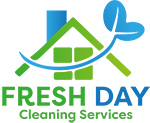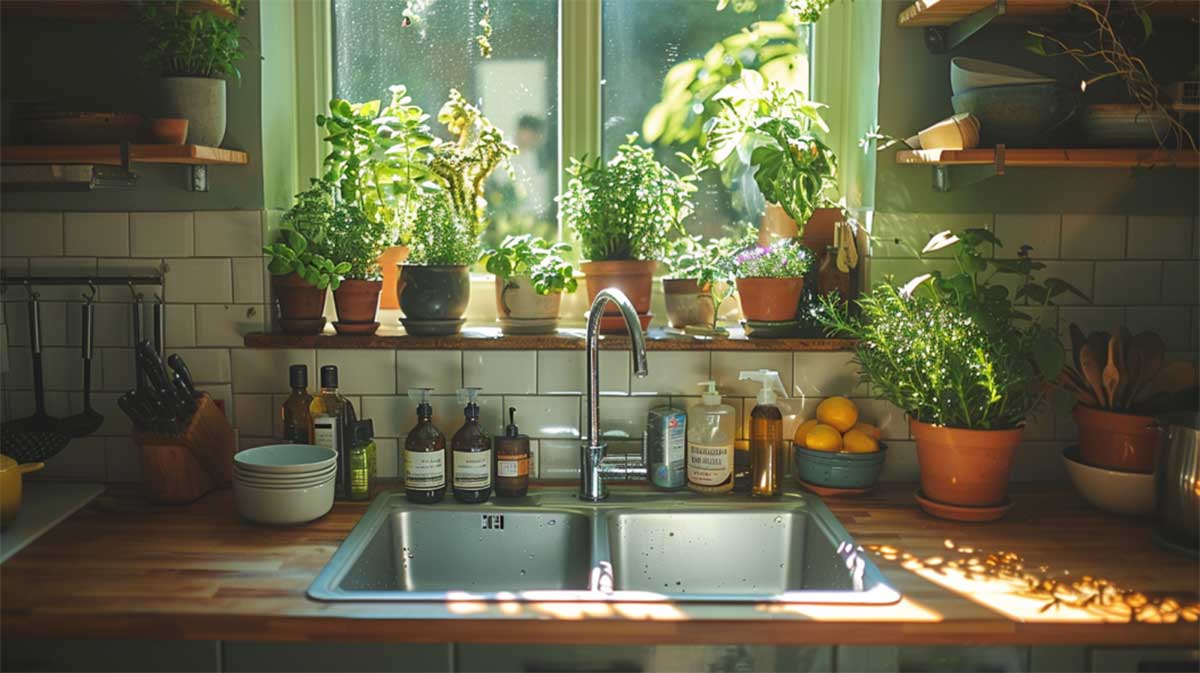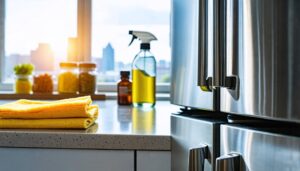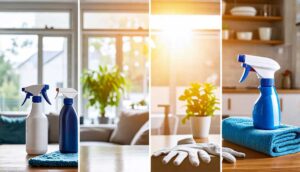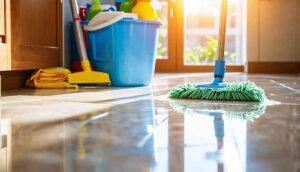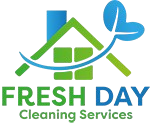Eco-friendly cleaning involves adopting practices and products that minimize environmental impact while promoting a healthier indoor environment. Simple swaps, such as using microfiber cloths, glass containers, and biodegradable sponges, can significantly reduce waste. DIY green cleaning solutions made from natural ingredients like vinegar, baking soda, and lemon juice offer effective and cost-effective alternatives to commercial cleaners. By choosing eco-friendly detergents, opting for energy-efficient laundry practices, and utilizing essential oils, individuals can reduce their reliance on harsh chemicals and promote sustainability. As you investigate these eco-friendly cleaning strategies, discover the many ways to transform your cleaning routine into a sustainable one.
Simple Swaps for a Greener Home
To establish a greener home, several simple swaps can be implemented in daily cleaning routines. Replacing traditional cleaning tools and laundry products with eco-friendly alternatives can significantly reduce environmental impact. By exploring reusable cleaning essentials, eco-friendly laundry options, and sustainable household hacks, individuals can effectively transition to a more environmentally conscious cleaning practice.
Reusable Cleaning Essentials
Embracing reusable cleaning essentials is a simple yet effective strategy for reducing household waste and cultivating a greener home, as evidenced by the significant impact of swapping disposable paper towels for microfiber cloths, which can decrease waste by up to 70%. This substitution is just one of many eco-friendly cleaning tips that can make a substantial difference. Utilizing glass containers for cleaning products is another sustainable practice that not only reduces plastic waste but also allows for easy refills, ultimately saving money. Homemade cleaning solutions made from pantry staples like vinegar and baking soda can effectively clean surfaces while reducing reliance on harsh commercial cleaners, promoting a healthier indoor environment.
Incorporating reusable cloths, such as microfiber, into daily cleaning routines can significantly minimize waste. Additionally, replacing conventional sponges with biodegradable options made from cellulose or cotton can decrease landfill waste while maintaining cleaning efficacy. By adopting these sustainable practices and making simple swaps, households can significantly reduce their environmental footprint and create a greener home. By implementing these eco-friendly cleaning tips, individuals can contribute to a more environmentally conscious lifestyle, one reusable cloth at a time.
Eco-Friendly Laundry Options
Simple swaps in laundry practices can significantly contribute to a greener home, with eco-friendly laundry options offering a viable alternative to traditional methods that often rely on harsh chemicals and excessive energy consumption. By adopting sustainable laundry habits, households can minimize their environmental footprint while maintaining cleanliness.
To make the transition to eco-friendly laundry, consider the following options:
- Opt for eco-friendly laundry detergents: Choose detergents that are free from phosphates and artificial fragrances, reducing skin irritation and environmental impact.
- Incorporate reusable dryer balls: Made from wool, these balls can reduce drying time and minimize waste while allowing you to add natural scents with essential oils.
- Implement cold water washing: Cold water washing can save up to 90% of the energy used by hot water, drastically reducing your household’s energy consumption.
Additionally, exploring DIY laundry solutions, such as using baking soda and vinegar, can effectively clean clothes while avoiding harsh chemicals. By incorporating these eco-friendly cleaning methods into your laundry routine, you can contribute to a more sustainable lifestyle and reduce water consumption. By making these simple swaps, you can significantly reduce your environmental impact and create a greener home.
Sustainable Household Hacks
For individuals seeking to make a tangible impact on reducing their household’s ecological footprint, exploring sustainable household hacks that incorporate straightforward yet effective swaps can significantly improve a greener living environment. Adopting simple yet impactful changes can transform daily routines into eco-friendly practices.
| Current Practice | Sustainable Swap |
|---|---|
| Plastic cleaning product bottles | Glass containers with refill options |
| Single-use paper towels | Reusable cloth rags or microfiber cloths |
| Commercial cleaning solutions | Homemade solutions made from pantry items (baking soda, vinegar) |
| Conventional laundry detergents | Eco-friendly detergents free from artificial fragrances and chemicals |
| Disposable sponges | Biodegradable sponges made from cellulose or cotton |
Embracing these sustainable household hacks enables individuals to contribute to a better environment. By swapping plastic bottles for glass containers and opting for homemade cleaning solutions, households can significantly reduce waste and minimize their ecological footprint. Additionally, using eco-friendly laundry detergents and biodegradable sponges supports sustainable practices and promotes healthier living spaces. These simple swaps can have a profound impact on the environment, making green cleaning a tangible reality.
Eco-Friendly Cleaning Essentials
The adoption of eco-friendly cleaning essentials is a vital step towards reducing environmental impact while maintaining cleanliness. Natural cleaning products, such as those derived from plant-based ingredients, and reusable cleaning tools, like microfiber cloths and washable mop heads, are fundamental components of an effective green cleaning routine. By incorporating these essentials, households can significantly minimize waste and exposure to harsh chemicals, promoting a healthier living space.
Natural Cleaning Products
Among the most effective ways to implement a sustainable cleaning routine is by incorporating natural cleaning products that harness the power of biodegradable ingredients and essential oils to effectively clean and disinfect without relying on harsh chemicals. This approach not only reduces the environmental impact of traditional cleaning methods but also promotes healthier indoor air quality.
Natural cleaning products offer a safer alternative to conventional cleaners, which often contain phosphates, bleach, and artificial fragrances that can harm human health and the environment. By switching to natural cleaning products, households can minimize their exposure to volatile organic compounds (VOCs) and create a healthier living space.
Here are three key benefits of using natural cleaning products:
- Effective cleaning: Natural cleaning products utilize biodegradable ingredients like vinegar, baking soda, and lemon juice to effectively clean and disinfect surfaces.
- Improved indoor air quality: Natural cleaning products reduce exposure to VOCs, promoting healthier indoor air quality and a safer living environment.
- Reduced environmental impact: By opting for natural cleaning products, households can minimize their reliance on harsh chemicals and reduce their environmental footprint.
Reusable Cleaning Tools
Embracing reusable cleaning tools is a pivotal step in shifting to an eco-friendly cleaning routine, as it significantly reduces waste and minimizes environmental impact. One of the most effective reusable cleaning tools is microfiber cloths, which can trap dirt and dust effectively while eliminating the need for single-use paper towels. Switching from disposable mop heads to machine-washable alternatives also minimizes environmental impact and promotes sustainability in cleaning routines.
Eco-friendly brooms made from sustainable materials, such as bamboo, reduce reliance on petroleum-based plastics and improve the durability and efficiency of cleaning efforts. Additionally, using natural sponges made from biodegradable materials like cellulose or cotton decreases landfill waste and can be composted at the end of their lifespan.
Investing in reusable cleaning tools supports a long-term sustainable approach to cleaning. When paired with homemade cleaning solutions stored in glass spray bottles, these tools promote a significant reduction in plastic waste. By incorporating these eco-friendly practices, households can significantly reduce their environmental footprint and maintain a clean, healthy living space. By making these simple changes, individuals can contribute to a more sustainable future.
DIY Green Cleaning Solutions
Embracing DIY green cleaning solutions involves harnessing the effectiveness of natural cleaning agents, such as vinegar, baking soda, and lemon juice, which offer non-toxic and cost-effective alternatives to commercial cleaners. By understanding the properties and applications of these agents, individuals can create homemade solution recipes tailored to their specific cleaning needs. This approach enables households to reduce their reliance on harsh chemicals and minimize waste, aligning with the principles of eco-friendly cleaning.
Natural Cleaning Agents
Natural cleaning agents, derived from common household items, offer a viable alternative to commercial cleaning products, providing effective and eco-friendly solutions for various cleaning tasks. By incorporating these natural agents into your cleaning routine, you can reduce your environmental footprint and promote healthier living.
Here are three examples of natural cleaning agents that can be used in various cleaning applications:
- Vinegar and Baking Soda: This combination can be used to create an all-purpose cleaner that is both non-toxic and effective. Vinegar serves as a disinfectant, while baking soda acts as a mild abrasive.
- Lemon Juice: The natural acidity of lemon juice makes it a powerful ingredient for removing stains and odors. It can be used to clean cutting boards and polish metal surfaces.
- Essential Oils: Certain essential oils, such as tea tree or lavender, possess antibacterial properties that can improve the efficacy of homemade cleaners. They can also provide a pleasant scent and enhance indoor air quality.
Homemade Solution Recipes
One effective way to reduce reliance on commercial cleaning products is to create homemade solution recipes that utilize common household ingredients, providing a cost-effective and eco-friendly alternative for various cleaning tasks. By leveraging everyday items, individuals can craft their own green cleaning agents that are gentle on the environment and human health.
For instance, a simple all-purpose cleaner can be made by mixing 1/2 cup of water with 1/4 cup of vinegar in a spray bottle. This solution is effective for disinfecting surfaces without harsh chemicals. Additionally, a paste created by combining baking soda with water can be used to tackle tough stains on sinks, bathtubs, and countertops. For greasy kitchen surfaces, a mixture of 1 cup of water and 1 tablespoon of dish soap can be employed. Moreover, a natural glass cleaner can be made by combining equal parts water and vinegar in a spray bottle and wiping with a microfiber cloth for a streak-free shine. These homemade solution recipes offer practical tips for adopting a green cleaning routine, reducing waste, and promoting a healthier living space. By embracing these DIY cleaning solutions, individuals can make a positive impact on the environment while maintaining a clean and hygienic home.
Sustainable Laundry Practices
In terms of sustainable laundry practices, two key areas of focus are the use of eco-friendly detergents and wool dryer balls. Eco-friendly detergents are formulated to minimize environmental impact, reducing the presence of harsh chemicals and artificial fragrances that can irritate skin and harm aquatic ecosystems. By combining these detergents with wool dryer balls, households can significantly reduce their reliance on single-use dryer sheets and promote a more efficient, environmentally conscious laundry routine.
Eco-Friendly Detergents
Embracing eco-friendly detergents in laundry practices not only reduces the environmental footprint of household chores but also promotes healthier living spaces by eliminating harsh chemicals and toxins. Traditional laundry detergents often contain harmful chemicals such as phosphates and dioxane, which can cause skin irritation and allergic reactions. In contrast, eco-friendly detergents are formulated with plant-based ingredients that are biodegradable and gentle on skin.
Here are three key benefits of switching to eco-friendly detergents:
- Reduced water pollution: Eco-friendly detergents break down more easily in water, decreasing the risk of water pollution and protecting aquatic ecosystems.
- Biodegradable packaging: Many eco-friendly detergents are packaged in biodegradable materials, minimizing plastic waste and supporting sustainable packaging practices.
- Energy efficiency: Some eco-friendly detergents are designed to work effectively in cold water, helping to reduce household utility bills and energy consumption.
Wool Dryer Balls
Wool dryer balls, a sustainable alternative to traditional dryer sheets, offer a natural and eco-friendly solution for reducing static cling and softening fabrics in the laundry process. By using wool dryer balls, households can significantly reduce waste and save money over time. These reusable balls can last for up to 1,000 loads, making them a cost-effective option in the long run. Additionally, wool dryer balls improve air circulation in the dryer, reducing drying time by 10-25% and conserving energy. This not only helps to lower energy bills but also contributes to a more sustainable laundry practice.
The use of wool dryer balls also promotes overall health by reducing exposure to synthetic chemicals found in traditional dryer sheets. These chemicals can irritate skin and exacerbate allergies. In contrast, wool dryer balls soften fabrics naturally, making them safer for sensitive skin. By incorporating wool dryer balls into your laundry routine, you can go green and start cleaning your home in a more eco-friendly way. With their biodegradable and compostable nature, wool dryer balls are an excellent addition to any sustainable cleaning regimen. By making this simple switch, you can significantly reduce your environmental footprint and create a healthier living space.
Natural Cleaning Alternatives
Natural cleaning alternatives offer a range of effective and eco-friendly options for household cleaning. By utilizing common household ingredients such as baking soda, vinegar, and essential oils, individuals can create customized cleaning solutions that are gentle on surfaces and the environment. This section will investigate the specific uses and benefits of baking soda, essential oil blends, and vinegar cleaning hacks, providing readers with practical tips for incorporating these alternatives into their cleaning routines.
Baking Soda Uses
Among the array of eco-friendly cleaning alternatives, baking soda stands out as a multifaceted agent that can effectively tackle a variety of cleaning tasks, from scrubbing surfaces to neutralizing odors, without compromising on safety or environmental sustainability. As a mild abrasive, baking soda is a versatile cleaning agent that can be used to scrub surfaces like sinks, bathtubs, and stovetops without scratching them.
Here are three key uses of baking soda in eco-friendly cleaning:
- Deodorizing: Baking soda’s deodorizing properties allow it to neutralize odors in refrigerators, carpets, and upholstery, making it an excellent natural air freshener.
- Stain removal: Baking soda can be used to remove tough stains from fabrics and carpets by creating a paste with water and applying it to lift stains effectively.
- Drain cleaning: When combined with vinegar, baking soda creates a chemical reaction that can help unclog drains by breaking down buildup and debris.
As a non-toxic and biodegradable ingredient, baking soda is a safe alternative for households with children and pets, ensuring a healthier living environment. Its effectiveness and safety make it an ideal addition to any eco-friendly cleaning routine.
Essential Oil Blends
Building on the versatility of eco-friendly cleaning agents like baking soda, incorporating essential oil blends into your cleaning routine can further improve the effectiveness and sustainability of your natural cleaning alternatives. Essential oils possess natural antibacterial and antiviral properties, making them effective components in DIY cleaning solutions. By combining essential oils with other eco-friendly cleaning agents, you can create powerful cleaning solutions that are free from harsh chemicals.
| Essential Oil | Cleaning Solution | Benefits |
|---|---|---|
| Lemon | All-purpose cleaner with vinegar | Cuts through grease and grime, natural fragrance |
| Eucalyptus | Laundry freshener | Eliminates odors, improves freshness without chemicals |
| Peppermint | Natural deodorizing paste with baking soda | Neutralizes odors on carpets and upholstery |
| Tea Tree | Natural disinfectant for surfaces | Antibacterial and antiviral properties, natural fragrance |
Essential oil blends can be used in various cleaning solutions, from all-purpose cleaners to laundry fresheners. They provide a natural fragrance and can improve the indoor air quality without synthetic fragrances or harmful chemicals. By incorporating essential oils into your cleaning routine, you can create effective and sustainable cleaning solutions that are gentle on the environment. With a little creativity, you can create your own DIY cleaning solutions using essential oils.
Vinegar Cleaning Hacks
Utilizing vinegar as a cleaning agent offers a multitude of benefits, from effectively removing tough stains and deodorizing surfaces to disinfecting and promoting a healthier home environment, all while serving as a cost-effective and eco-friendly alternative to harsh chemical-based cleaning products.
Vinegar’s high acidity makes it a powerful ally in household cleaning, capable of tackling a variety of tasks. Here are three vinegar cleaning hacks to incorporate into your eco-friendly cleaning routine:
- All-purpose cleaner: Mix equal parts vinegar and water to create a streak-free shine on countertops, glass, and bathroom fixtures.
- Hard water stain remover: Use vinegar to dissolve mineral deposits and remove hard water stains from surfaces, restoring their original appearance.
- Natural deodorizer: Spray vinegar lightly on fabrics and carpets to eliminate odors, neutralizing unpleasant scents without the use of synthetic fragrances.
Vinegar’s antimicrobial properties make it an effective disinfectant, killing certain bacteria and germs while avoiding the use of toxic cleaning agents. By incorporating vinegar into your cleaning routine, you can create a healthier home environment while minimizing your environmental footprint. As an eco-friendly alternative to commercial cleaning products, vinegar is a versatile and effective solution for a variety of cleaning tasks.
Frequently Asked Questions
How Do You Make Eco-Friendly All Purpose Cleaners?
To create an eco-friendly all-purpose cleaner, combine 3/4 cup of water with 1/2 cup of white vinegar in a spray bottle. This natural disinfectant and deodorizer is effective against bacteria and grime. Optionally, add 10-15 drops of essential oils, such as lavender or tea tree oil, to improve cleaning properties and mask the vinegar smell. This solution is a cost-effective and environmentally friendly alternative to commercial cleaners.
What Eco-Friendly Cleaning Was on Shark Tank?
On Shark Tank, eco-friendly cleaning products have gained significant attention, showcasing a market demand for sustainable household solutions. Brands like The Good Home Co. and Grove Collaborative have successfully pitched their natural and non-toxic cleaning products, emphasizing eco-friendly packaging and reducing plastic waste. These companies have utilized the platform to boost sales and brand recognition, catering to environmentally conscious consumers seeking safe and effective cleaning solutions.
How to Be Eco-Friendly With Cleaning Products?
As we navigate the labyrinth of cleaning products, a guiding light of sustainability shines bright. To be eco-friendly with cleaning products, it’s essential to scrutinize labels and opt for biodegradable and phosphate-free alternatives. Replacing single-use items with reusable cloths and mops significantly reduces waste. In addition, embracing homemade cleaning solutions crafted from natural ingredients like vinegar and baking soda not only minimizes environmental impact but also promotes a healthier indoor environment.
How Do I Start an Eco-Friendly Cleaning Business?
To initiate an eco-friendly cleaning business, research local regulations and certifications required for environmentally responsible services. Develop a comprehensive business plan, outlining marketing strategies, pricing structures, and operational protocols. Invest in eco-friendly cleaning supplies and equipment, and establish a team of trained professionals knowledgeable about sustainable practices. Guarantee compliance with environmental standards and obtain necessary certifications to build credibility and attract eco-conscious clients.
